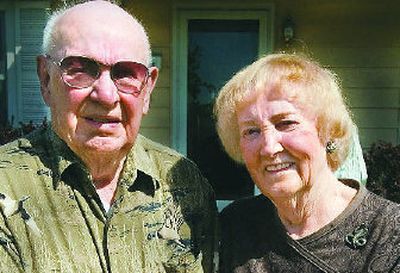Love stories: Luck, fate brought Roskelleys together

Love and luck often seem intertwined. Fenton and Violet Roskelley found lasting love, thanks to a slip of paper, drawn at random, from a hat.
They met in England in 1944. Violet, from Yorkshire, had been drafted into the army. Brash, young American soldiers were everywhere, and the British girls were crazy about them.
But not Violet. “I told my sister, Betty, ‘Don’t’ get mixed up with an American,’ ” she recalled. “They were a little too friendly for me.”
Violet worked in communications at a command post. One day a message arrived requesting an operator at regimental headquarters. In the interest of fairness, Violet suggested they put all 12 operators’ names in a hat and draw one to see who would have to be transferred. Violet reached in and drew out a slip of paper. To her dismay she drew her own name.
“I was very upset. I didn’t want to leave all my friends,” she said. But, off she went to headquarters at Penhale House in Cornwall. One afternoon she decided to take a walk. “Along comes this good-looking American,” she said. He offered a friendly greeting and asked if he could accompany her. “We just talked and visited,” Violet said, “and then he asked if he could see me again.”
The soldier was Fenton Roskelley from Challis, Idaho. He’d been drafted into the Army in 1942, and sent to England. “My outfit was attached to her regiment,” he said.
Roskelley vividly remembers that first meeting. “I knew the type of girl she was from our first conversation. I knew instantly that she was the girl for me.”
For Violet, meeting Ross – as she calls him – shattered her preconceived notion about Americans. “He was a gentleman, educated, everything a girl could want,” she said with a smile.
He courted her with long walks in the countryside, dart games at the local canteen and K-rations. “I loved to eat the chocolate out of the rations,” Violet said. “It wasn’t great chocolate, but it was more than we had at the time.”
Soon Roskelley got word that he was being shipped out. Before he left he asked Violet if she would agree to be engaged. They’d known each other six weeks. “I couldn’t imagine living in America,” she said. “England was my whole world.”
Still, before he left she agreed to the engagement. The couple kept in touch through letters. “I still have every letter he wrote me,” Violet said.
Roskelley went on to Paris and then to Germany. Violet had been sent to Kent. One day she got a telegraph from her mother. It read, “Violet, you’d better get leave. Ross is coming home to marry you.” Shaking her head with disbelief, Violet said, “So, I got leave and went to Yorkshire.” She hastily made arrangements for the wedding.
Meanwhile, in Germany, Roskelley also made wedding preparations. “For the first time in my life, I used the black market,” he said. He gathered cigarettes and sugar to barter. “I wanted my bride to have a good honeymoon, and I wanted to have money to spend on her.” He collected the equivalent of $500 and presented it to Violet. He chuckled. “She’d never seen so much money in her life!”
They married on March 23, 1945. Both wore their uniforms. Violet’s regiment had one wedding dress that they shared among them. She shuddered, “I could have worn the regimental wedding dress, but everyone else had worn that.”
On their honeymoon the realities of marriage set in for her new husband. “I had to go shopping with her,” he said, shaking his head. “I’ve never liked shopping.”
Roskelley went back to Germany and the two didn’t see each other again until August, when he came to London before being sent home to the states. He returned to his civilian job at the Spokane Daily Chronicle and waited for his bride to join him.
In April 1946 Violet endured an arduous 14-day crossing to America. “I was seasick the entire time,” she sighed.
A weeklong journey by train brought her to Spokane. She arrived at night. After enduring London blackouts for so long, the sight of Division Street rolling out before her, glittering with lights, took her breath away. She said, “It looked like a fairy land. I’d never seen anything more beautiful in my life.”
Violet became an American citizen in 1949. The couple raised three children, Patricia, John and Heather, in their North Side home.
Roskelley was an outdoor writer, editor and reporter for Spokane newspapers for more than 60 years, and is still writing. “I’m working on a memoir,” he said. “And I’ve started a book about World War II.”
When asked to what he attributes the longevity of their 62-year marriage, Roskelley replied, “I married the type of woman who doesn’t like change.”
Violet gazed fondly at him. “My husband is handsome, intelligent, thoughtful, a good provider.” And she still asks, “What more could a girl want?”
Nothing.
The couple is well aware of the part luck plays in their story. A story made possible by a slip of paper, drawn from a hat.